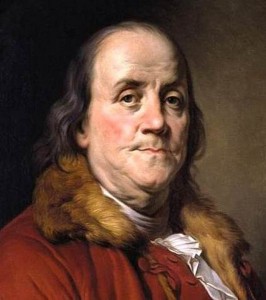Words From Our Founders: Franklin’s Plea for Prayer

Today we continue our series examining our Founding Fathers in their own words and considering their high esteem for religion, religious liberty, and virtue.
Below is a transcript of Benjamin Franklin’s motion requesting a chaplain be appointed to offer daily prayers before discussing adoption of a federal constitution — dated June 28, 1781.
Mr. President, the small progress we have made after four or five weeks’ close attendance and continual reasonings with each other–our different sentiments on almost every question, several of the last producing as many noes as ayes–is, methinks, a melancholy proof of the imperfection of the human understanding. We indeed seem to feel our own want of political wisdom, since we have been running about in search of it. We have gone back to ancient history for models of government, and examined the different forms of those republics which, having been formed with the seeds of their own dissolution, now no longer exist. And we have viewed modern states all round Europe, but find none of their constitutions suitable to our circumstances.
